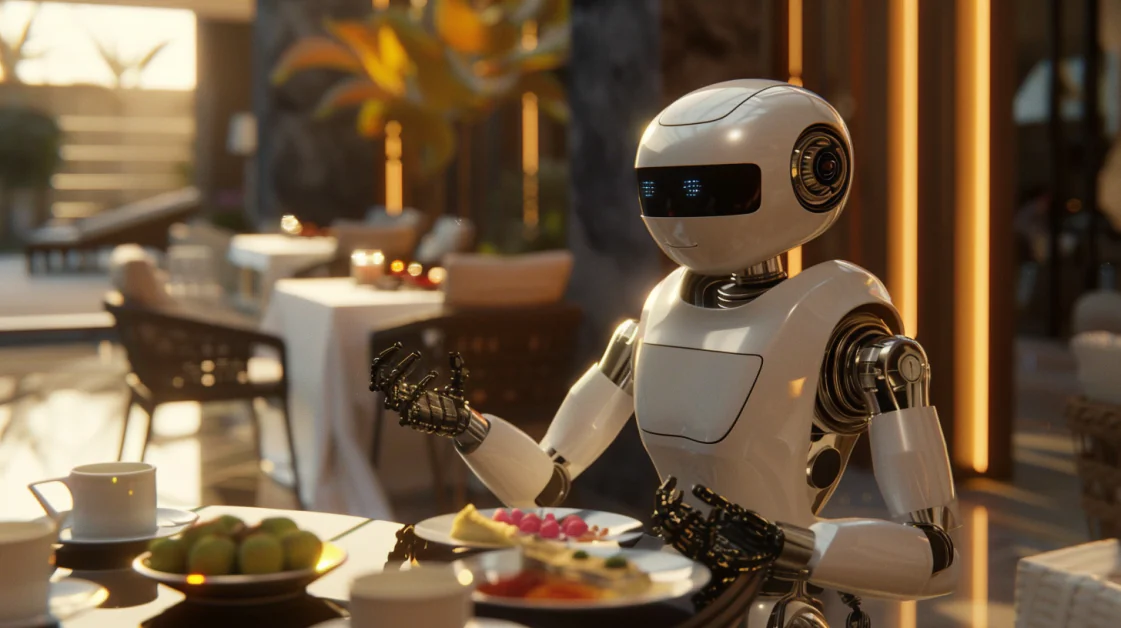Could “Robot-Phobia” Worsen the Hospitality Industry’s Labor Shortage?
The hospitality industry has grappled with a severe labor shortage since the COVID-19 pandemic. As businesses struggle to find enough workers to meet the growing demand, many have turned to robotic technology as a potential solution. However, a recent study conducted by Washington State University suggests that the introduction of robots in the workplace may […] The post Could “Robot-Phobia” Worsen the Hospitality Industry’s Labor Shortage? appeared first on Unite.AI.


The hospitality industry has grappled with a severe labor shortage since the COVID-19 pandemic. As businesses struggle to find enough workers to meet the growing demand, many have turned to robotic technology as a potential solution. However, a recent study conducted by Washington State University suggests that the introduction of robots in the workplace may inadvertently exacerbate the labor shortage due to a phenomenon known as “robot-phobia” among hospitality workers.
Robot-phobia, defined as the fear that robots and technology will replace human jobs, has been found to have a significant impact on the well-being and job satisfaction of hospitality employees. The study sheds light on the unintended consequences of implementing robotic technology in the hospitality sector and emphasizes the need for employers to address these concerns to maintain a stable workforce.
The new research comes at a time when the global hospitality robots market size is predicted to reach USD 3.1 billion by 2030, at a CAGR of roughly 25.51% between 2023 and 2030.
The Impact of Robot-phobia on Hospitality Workers
The Washington State University study, which surveyed over 620 lodging and food service employees, revealed that robot-phobia has far-reaching effects on hospitality workers. The fear of being replaced by robots led to increased job insecurity and stress among employees, ultimately resulting in higher turnover intentions.
One of the most striking findings of the study was that the impact of robot-phobia was more pronounced among employees who had direct experience working with robotic technology. This suggests that exposure to robots in the workplace does not necessarily alleviate the fear of job displacement but may instead intensify it. Furthermore, the study found that both frontline employees and managers were affected by robot-phobia, highlighting the pervasive nature of this issue across different levels of the organizational hierarchy.
The implications of these findings are significant for the hospitality industry. With turnover rates already among the highest across all non-farm sectors, the added stress and job insecurity caused by robot-phobia could further contribute to the labor shortage.
As lead author Bamboo Chen points out:
“For everyone, regardless of their position or sector, robot-phobia has a real impact.”
Employers must take this issue seriously and develop strategies to address the concerns of their workforce to maintain stability and prevent a further exodus of talent.
As the labor shortage persists, many hospitality businesses have turned to robotic technology to bridge the gap. Robots and automation have been introduced in various forms, such as human-like robot servers, automated robotic arms, self-service kiosks, and tabletop devices. These technologies are designed to augment service and improve efficiency by handling tedious and repetitive tasks that human workers often find undesirable, such as washing dishes or managing hotel laundry.
Perceptions and Attitudes Towards Robots
The study also explored the role of employee perceptions and attitudes towards robots in shaping their job satisfaction and turnover intentions. The findings revealed that employees who viewed robots as more capable and efficient were more likely to have higher turnover intentions. This suggests that the perceived threat of being replaced by superior technology can significantly influence an employee's decision to leave their job.
To address this issue, employers must strive to create a balanced perspective on robotic technology among their workforce. This involves communicating not only the benefits but also the limitations of robots and emphasizing the vital role that human workers play in the hospitality industry. By fostering a culture that values human-robot collaboration rather than competition, employers can help alleviate the fear and insecurity associated with robot-phobia.
Addressing the Negative Feedback Loop
The study warns of a potential “negative feedback loop” that can arise from the increased turnover caused by robot-phobia. As more human workers quit their jobs due to the fear of being replaced by robots, the labor shortage may worsen, leading businesses to rely even more heavily on automation. This cycle can perpetuate the problem and create a vicious cycle that undermines the stability of the hospitality workforce.
To break this negative feedback loop, employers must be proactive in addressing robot-phobia and implementing strategies for introducing new technology in a manner that minimizes employee apprehension. This can involve:
- Focusing on human-robot collaboration: Emphasize how robots can work alongside human workers to enhance service and improve overall efficiency, rather than replacing them entirely.
- Providing clear communication and training: Ensure that employees understand the purpose and limitations of the robotic technology being introduced. Offer training programs to help workers adapt to working alongside robots and develop the necessary skills to thrive in a technology-enhanced environment.
- Encouraging employee feedback and participation: Involve employees in the process of introducing new technology and solicit their input and concerns. This can help foster a sense of ownership and control, reducing feelings of job insecurity.
- Investing in employee development: Provide opportunities for workers to upskill and reskill, enabling them to take on new roles and responsibilities that complement the capabilities of robots.
By adopting a proactive and employee-centric approach to introducing robotic technology, hospitality businesses can mitigate the negative impact of robot-phobia and create a more stable and sustainable workforce.
A Quick Summary
The Washington State University study on robot-phobia in the hospitality industry has shed light on a critical issue that employers must address to navigate the ongoing labor shortage. The fear of being replaced by robots has been found to increase job insecurity and stress among hospitality workers, leading to higher turnover intentions.
As businesses increasingly adopt robotic technology to fill labor gaps, it is crucial to recognize the potential unintended consequences and develop strategies to mitigate the negative impact on employees. By fostering a culture of human-robot collaboration, providing clear communication and training, and investing in employee development, hospitality businesses can overcome the challenges posed by robot-phobia and create a more stable and sustainable workforce. Ultimately, the success of the industry in navigating this technological shift will depend on its ability to strike a balance between the benefits of automation and the well-being of its human workers.
The post Could “Robot-Phobia” Worsen the Hospitality Industry’s Labor Shortage? appeared first on Unite.AI.













